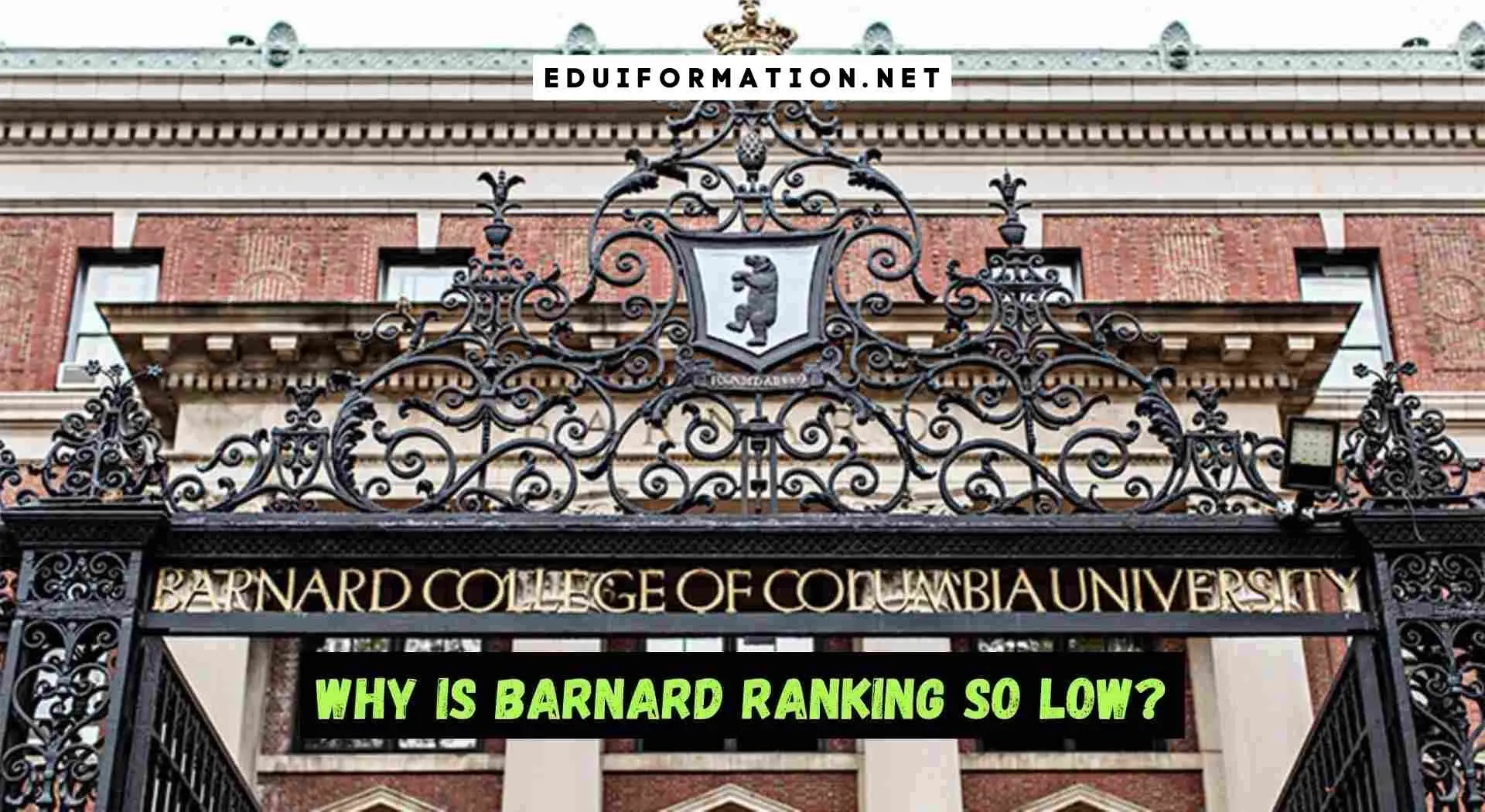Barnard’s low ranking may be due to factors such as competition from larger institutions and limited resources. Barnard College, a prestigious women’s liberal arts college affiliated with Columbia University, has faced challenges that have led to its low ranking in recent years.
While Barnard boasts an impressive academic program and a long history of empowering women, various factors may contribute to its lower position in rankings. One possible reason is the intense competition from larger universities that have greater resources and wider name recognition.
Additionally, Barnard’s relatively smaller size and limited budget might hinder its ability to invest in cutting-edge facilities and attract renowned faculty. Despite these challenges, barnard college continues to strive for excellence and uphold its mission of providing a top-quality education for women.
The Current Ranking Of Barnard College

Barnard College currently has a low ranking due to various factors. By analyzing these factors, such as limited resources and competition, it becomes clear why the college’s ranking may be lower compared to other institutions.
Understanding The Significance Of College Rankings
Barnard College, a prestigious women’s liberal arts college located in new york city, has been a prominent institution for over a century. However, when it comes to college rankings, Barnard’s current placement may seem surprising. In this section, we will delve into the factors contributing to Barnard’s low ranking and shed light on the significance of college rankings.
How Barnard’s Current Ranking Compares To Other Colleges
Barnard College, despite its rich history and notable contributions to higher education, currently finds itself placed lower in college rankings. Here’s a comparison with other colleges to provide a broader perspective:
- Barnard College is ranked within the top 50 liberal arts colleges by u.s. news & world report, showcasing its reputable standing in the academic community.
- In terms of national rankings, Barnard is ranked lower compared to larger institutions due to variations in criteria and methodologies used by different ranking systems.
- However, the low positioning in rankings does not diminish the quality of education and resources available at Barnard College.
Examining Barnard’s Academic Programs

Barnard’s low ranking prompts an examination of its academic programs. Looking at the offerings, it becomes apparent that the ranking doesn’t accurately reflect the quality and breadth of education available at Barnard College. Grand and diverse academic programs go unrecognized, resulting in an undeserved low ranking.
Barnard College is widely respected for its dedication to empowering women and providing a top-notch education. However, it is important to examine the academic programs offered by the institution to understand why it may be ranked lower compared to other colleges and universities.
In this section, we will take a closer look at Barnard’s academic offerings, highlight their strengths and weaknesses, and compare them to higher-ranked institutions.
Overview Of Barnard’s Academic Offerings:
- Barnard College offers a wide range of academic programs, providing students with numerous opportunities to explore their interests and pursue their passions.
- The college is known for its strong liberal arts curriculum, which fosters critical thinking, creativity, and interdisciplinary learning.
- Barnard’s academic programs emphasize the development of analytical skills, writing proficiency, and a global perspective, equipping students for success in various careers and postgraduate studies.
- With around 50 majors and over 40 minors, students can choose from a diverse selection of academic disciplines, including social sciences, natural sciences, humanities, and the arts.
Strengths And Weaknesses Of Barnard’s Programs:
Strengths:
- Barnard College is renowned for its exceptional faculty who are experts in their respective fields. They are committed to providing quality education and engaging students in unique learning experiences.
- The college emphasizes strong mentorship and small class sizes, allowing for personalized attention and fostering meaningful connections between students and professors.
- The location of Barnard College in new york city offers unparalleled access to internships, research opportunities, and cultural experiences that enrich students’ academic journeys.
Weaknesses:
- Despite its strengths, one area that barnard college faces criticism is the relatively limited number of academic programs compared to larger institutions. This may limit some students’ options and areas of study.
- The college also faces challenges in terms of outdated facilities and limited resources in certain disciplines, which can affect the overall learning experience for students in those specific fields.
Comparing Barnard’s Programs With Higher-Ranked Institutions:
- When comparing Barnard’s academic programs with those of higher-ranked institutions, it is essential to consider the unique focus and mission of the college.
- Barnard College stands out for its commitment to women’s education and its dedication to providing a supportive environment for female students.
- While some institutions may have a broader range of academic programs, Barnard’s emphasis on the liberal arts, combined with its strong faculty and personalized approach, offers students a distinctive educational experience that prepares them for future success.
Barnard College’s academic programs offer students a comprehensive and rigorous education, albeit with some limitations in terms of program variety and resources. By highlighting the strengths and weaknesses of these programs and comparing them with higher-ranked institutions, we gain insight into the factors that may contribute to their lower ranking.
Nevertheless, Barnard’s commitment to empowering women and its strong liberal arts foundation remain at the core of its academic offerings.
The Impact Of Financial Resources On Barnard’s Ranking

The low ranking of Barnard College can be attributed to the limited financial resources available to the institution, which affects its ability to invest in various areas such as facilities, faculty, and student resources. This ultimately impacts its overall reputation and standing in national rankings.
Exploring Barnard’S Endowment And Financial Resources
Barnard College, a prestigious women’s liberal arts college, has been facing lower rankings compared to other institutions. One major factor impacting Barnard’s ranking is its financial resources. In this section, we will delve into the college’s endowment and financial situation, how it affects its ranking, and strategies that could help improve this situation.
Barnard’S Endowment And Financial Situation:
- Barnard College possesses a significant endowment that supports its operations. However, compared to other colleges, its endowment is relatively low.
- The college relies heavily on tuition fees, which compromises its financial stability and impacts the allocation of resources.
- Limited financial resources hamper the college’s ability to invest in faculty development, infrastructure improvements, and innovative research programs.
How Financial Resources Affect A College’S Ranking:
- The availability of funds impacts the quality and quantity of faculty. Insufficient financial resources can result in limited hiring opportunities for top-tier faculty members.
- Financial resources directly influence the college’s capacity to provide state-of-the-art facilities and technology, affecting the overall learning environment.
- Colleges with greater financial resources can offer a wider range of academic programs and extracurricular activities, attracting a broader pool of talented students.
- Financially robust institutions can allocate resources to improve student support services, scholarships, and research opportunities, enhancing the overall college experience.
Strategies For Improving Barnard’S Financial Situation:
- Foster stronger alumni engagement to encourage increased endowments and donations.
- Cultivate a culture of giving through alumni events, networking opportunities, and meaningful interactions.
- Highlight success stories of alumni to inspire greater support for the college.
- Seek partnerships and collaborations with corporations, organizations, and foundations to secure additional funding.
- Develop mutually beneficial relationships through research collaborations, internship programs, and sponsored projects.
- Enhance fundraising efforts through targeted campaigns and appeals.
- Identify key areas where the college needs additional financial support and create compelling initiatives to attract donors.
- Implement cost-cutting measures and increase operational efficiency.
- Conduct thorough financial analyses to identify areas for optimization without compromising the quality of education.
- Explore collaborative purchasing agreements with other institutions to reduce costs.
By exploring Barnard’s endowment and financial resources, understanding the impact they have on college rankings, and implementing effective strategies, the college can work towards improving its financial situation and ultimately enhance its ranking position.
Investigating External Factors Affecting Barnard’s Ranking

Barnard’s low ranking is being investigated based on various external factors that might contribute to its position. Researchers are exploring these factors to gain insights into the reasons behind Barnard’s ranking.
Barnard College, a prestigious women’s liberal arts college in new york city, has been catching some attention lately due to its low ranking compared to other renowned institutions. This begs the question: why is Barnard ranking so low? In this section, we will investigate the external factors that may be affecting Barnard’s ranking.
These factors include external rankings, the impact of location and surrounding institutions, and other external influences.
External Rankings And Their Influence On Barnard’S Ranking:
- The college rankings system plays a significant role in shaping perceptions about the quality and standing of an institution.
- External rankings, such as those conducted by u.s. news and world report or Forbes, heavily impact the perception and reputation of Barnard College.
- In some cases, these rankings might not accurately reflect the true quality of education or the unique attributes of Barnard.
- Rankings often prioritize factors like endowment size, spending per student, or even subjective opinions, which might not align with Barnard’s mission and values.
- It is essential to consider these rankings with caution and to delve deeper into the specific factors that affect them.
The Impact Of Location And Surrounding Institutions:
- Barnard College’s location in the vibrant city of new york comes with its advantages and challenges.
- Being in proximity to renowned institutions like columbia university allows for collaboration and academic opportunities. However, this can also lead to comparisons that may impact Barnard’s ranking.
- The resources and opportunities available in the city can greatly enhance the college experience, but they may not be accurately reflected in rankings that focus primarily on academic factors.
- Additionally, the cost of living in a city like new york might deter some students from considering Barnard as an option.
Other External Factors Affecting Barnard’S Ranking:
- Funding and resources: The financial resources available to an institution can significantly affect its ranking. While Barnard has a strong endowment, it may still face challenges in terms of resources when compared to larger universities.
- Alumni and reputation: The success and accomplishments of an institution’s alumni can greatly contribute to its reputation and ranking. Barnard’s alumni network and their achievements may not always be adequately reflected in ranking methodologies.
- Admission standards: Institutions with highly selective admission standards tend to have higher rankings. While Barnard has rigorous admission criteria, this might not translate into a higher ranking due to the specific factors considered in the rankings.
- Institutional focus: Barnard College’s emphasis on empowering women and providing a liberal arts education might not align with the criteria used by ranking systems that emphasize different aspects of an institution’s offerings.
Barnard College’s low ranking might be influenced by various external factors, including the methodologies of ranking systems, its location, and surrounding institutions. It is crucial to consider these factors alongside the college’s unique strengths and attributes when evaluating its overall quality and reputation.
Frequently Asked Questions For Why Is Barnard Ranking So Low
What Factors Contribute To Barnard’S Ranking?
Several factors contribute to Barnard’s ranking, including student selectivity, graduation rate, faculty expertise, campus resources, and alumni success. These criteria are evaluated to determine the college’s overall ranking.
Does Barnard’S Low Ranking Reflect Its Quality Of Education?
Barnard’s ranking does not solely reflect the quality of education it offers. Rankings are based on various factors, and while they provide a snapshot, it’s important to consider other aspects such as faculty-student relationships, academic programs, and student satisfaction.
How Can Barnard Improve Its Ranking?
Barnard College continually strives to enhance its ranking by investing in academic programs, faculty recruitment, and student resources. The college focuses on maintaining a supportive learning environment and fostering student success to improve its overall ranking.
What Are Some Advantages Of Attending Barnard Despite Its Ranking?
Despite its ranking, barnard college offers numerous advantages such as access to resources from Columbia University, a collaborative and diverse community, and a strong network of accomplished alumni. These factors contribute to a holistic educational experience that prepares students for future success.
Conclusion
Barnard’s low ranking can be attributed to several factors. Firstly, the college’s smaller size and specialized focus may limit its research opportunities and overall resources. Additionally, its location in a highly competitive academic environment means that it is constantly compared to larger and more well-established institutions.
Moreover, the ranking system itself may not fully capture the unique strengths and offerings of Barnard College. While rankings emphasize factors such as research output and faculty credentials, they may overlook the college’s commitment to a liberal arts education and its focus on women’s leadership.
However, it is essential to remember that rankings are not the sole determinant of a college’s quality. Barnard’s reputation, strong alumnae network, and the unique experiences it offers to its students are highly valued by those who attend. Ultimately, it is crucial to consider a variety of factors that align with individual goals and values when evaluating the quality of a college, rather than relying solely on rankings.

